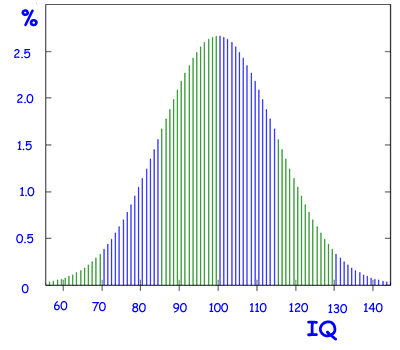IQThe term "IQ", comes from the German Intelligenz-Quotient (intelligence quotient). It was devised by the German psychologist William Stern in 1912. He put forward a method of comparing the results of children's intelligence tests and hence comparing their intelligence by means of a number. The tests themselves were not devised by him - he just worked out a nice numerical way of comparing results! Your IQ is worked out by setting the 'average' of the normal distribution of results in an intelligence test as 100 (see the graph). Your final score is worked out by comparing the distribution of results others have achieved on the test. There is a lot of discussion as to how reliable this score is as the tests used are heavily weighted towards mathematical, verbal and spatial reasoning and do not take into consideration many human skills (see intelligence). They can also have strong cultural bias and schooling can prepare candidates for the type of question to be set - giving them an advantage over those who have never seen questions of that type before. Devising an unbiased test is very difficult indeed and tests now include a pre-test sample work through of questions to attempt to even the playing field. Organisations such as MENSA acknowledge that different tests result in different scores - therefore to join them you have to take their own test! Nevertheless these test scores have been used to monitor and predict potential ability in children for a long time. Although it is now 'out of favour' to calculate a child's IQ, school entrance examinations tend to be of the same format as the IQ tests set in the 1950s and 1960s as 'Eleven Plus' examinations. It could be also argued that all examinations do a similar thing when awarding grades (e.g. a 'C' at GCSE or A level is usually set near the peak of the normal distribution curve shape) and therefore the GCSE grades do a similar job to assessing IQ.
Normal Distribution & IQ ScoresThe properties of the normal distribution apply to IQ scores:
At a selective grammar school the entrance test ensures that the pupils have an IQ of >120 and fall in the top 10% of the population - therefore all pupils are capable of a good University level education.... but how they develop their natural gifts on entry to high school can have a big impact on what they later achieve... An IQ of >130 indicates that you are in the top 2% of the population...>140 top 0.37%...>150 top 0.06%... you get the idea! BUT if you are one of these super brain power types what are you doing with that power? As Uncle Ben says - 'With great power comes great responsibility!' |
|

Custom Search



